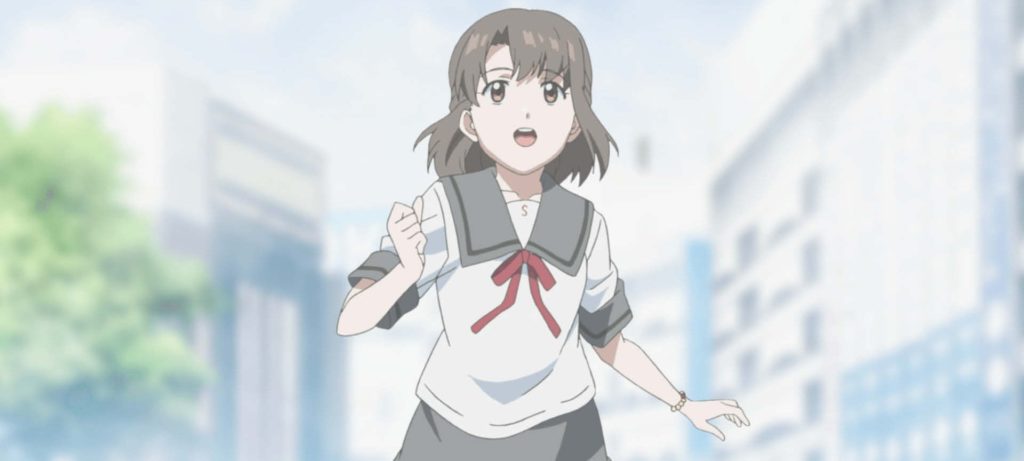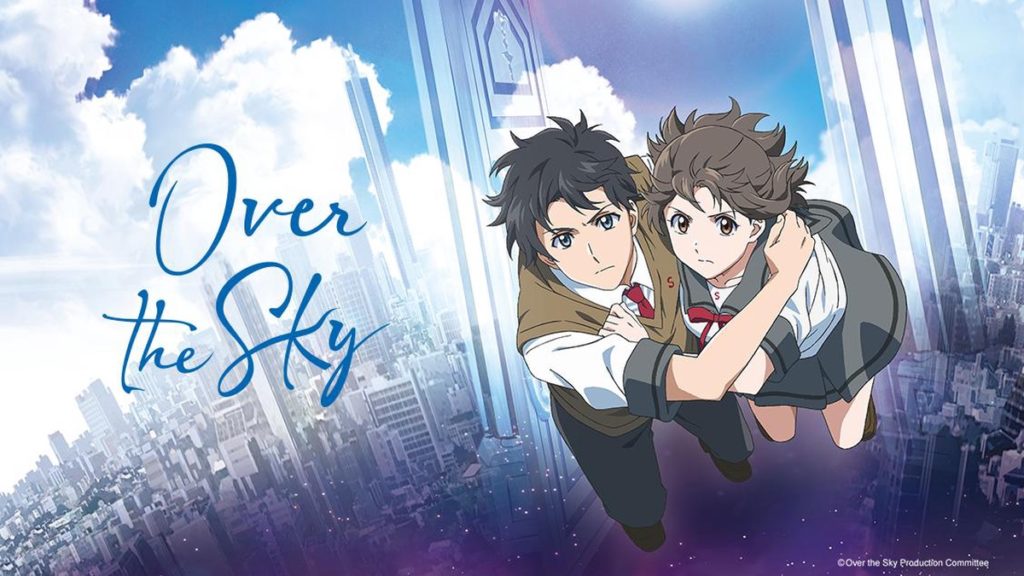Over the Sky
August 15, 2023 · 0 comments
By Andrew Osmond.

Over The Sky, a cinema fantasy adventure, is a close relative to Keiichi Hara’s 2019 film Birthday Wonderand. They’re both family-friendly anime, without violence or vulgarity, though Over the Sky has threats and even anguish in its closing stretch.
They’re both films about teenage girls entering fantasy otherworlds that do not use, or even acknowledge, the tropes of so-called “isekai” anime. By “isekai,” I mean the slew of “going to other worlds” anime since the 2010s that refer extensively to videogames, otaku culture, and each other. Instead, the films draw on older kinds of fantasy.
Over the Sky feels very close to Spirited Away at some points, and also to ancestors like Wizard of Oz (especially the film musical). Significantly, the heroines in Oz, Birthday Wonderland and Over the Sky all want to get home again, which isn’t the case with many isekai leads. I talk more about older fantasy’s influence on anime here, and Jeanette Ng dives deeper into the issues here.

Over the Sky’s heroine is Mio, a teenage girl. Like Chihiro in Spirited and Akane in Birthday Wonderland, she seems listless and unmotivated. In the opening moments, we see Mio drop out of sports training in school. Even when her friend Arata encourages her to go back and finish, she says there’s no point. Arata, incidentally, has been her male friend since childhood, and it’s clear adolescence has started to complicate the youngsters’ feelings about each other. While the film is mostly Mio’s story, Arata plays a large role; indeed, there could have been a whole other film from his perspective.
There’s a classroom scene, after something important has happened, when we hear a teacher declaim a poem about how it feels so comfortable in spring that you oversleep. Or to be exact, “In spring slumber, I am unaware of daybreak” As Jonathan Clements points out during his interview with the director Yoshinobu Sena at Scotland Loves Anime, the poem is Chinese, by Meng Haoran from the Tang Dynasty. Sena explained that for him, it fitted Mio’s situation. Although she’s in the spring of her life, a time when pop-culture (including much anime) insists someone of her age should be out on adventures, Mio would rather sleep it away.

Building on this point, you could make a link with one of the best jokes in Mamoru Hosoda’s film, The Girl Who Leapt Through Time. That film’s heroine has just started to “leap” in time. In panic, she consults her wise aunt, who cheerfully tells her that high-school girls do it all the time. After all, how often did she herself sleep late in bed as a teen, thinking she didn’t want to do anything… and then all of a sudden, she was wondering where the lovely free day had gone?
Following tradition, Mio in Over the Sky must be kicked out of her ennui by going to a magical place. Rather more unusually, the magic world where she ends up is an alternative version of her everyday neighbourhood. It’s Ikebukuro, a district in central Tokyo, but much emptier. There are various magic figures to discover, both friendly and menacing. One thing to notice: when Mio reaches the “alternate” Ikebukuro, all the background “environment” sounds are played backwards.

Foreign viewers will know Ikebukuro from the Durarara!! saga (although as this blog noted, the real place is ridiculously safe in comparison). The film features the Toden Arakawa tram (not train) line that runs through the area; Mio and her friends use it for their daily commute. There are also glimpses of Ikebukuro’s signature owl statues; the Seibu store rooftop garden; and the popular “Sunshine City” rooftop aquarium. Here, penguins seem to fly through the sky, setting up a fantastical payoff later in the film. (The same aquarium figures heavily in the Penguindrum series by Kunihiko Ikuhara).
The idea of using a “real” urban setting as the background to an otherworld fantasy isn’t so common in Western media. A vintage example, though, is the film The Wiz (1978), an all-black reworking of The Wizard of Oz where Diana Ross’s Dorothy finds herself in a fantasy New York. In Japan, the idea’s often associated with combat death games – it’s a staple of the Persona franchise, while both Gantz and the recent Alice in Borderland transport characters to “shadow” versions of Tokyo, full of murderers and monsters. There’s also the nightmarish climax to Mamoru Hosoda’s Mirai, whose toddler hero is lost in a giant-sized version of Tokyo’s already massive stations, with dragon trains and alien adults.
As noted, Over the Sky also gets intense in its last act, as Mio realises there may be no way home for her at all, and the reason is unspeakable. (Plainly she never read Kenji Miyazawa’s Night on the Galactic Railroad.) But all is not lost, thanks to her allies in this fantasy Tokyo. There’s Kiku-chan, a young woman who remembers Mio from somewhere, as Mio does her. She’s voiced in Japanese by the prolific Saori Hayami, who was Shoko in A Silent Voice and Saki in Eden of the East.
Then there’s Gimon, who looks like a giant furry plush toy and who actually is a plush toy in Mio’s world, as well as a cartoon picture on the LINE messages that she sends on her phone. He, or they, amusingly has two Japanese voices – an “old man” voice provided by Koichi “Spike Spiegel” Yamadera, and a girly voice from Ikue Otani, who’s Pikachu in Pokemon and Chopper in One Piece.
Andrew Osmond is the author of 100 Animated Feature Films. Over the Sky is available to preorder in the UK from Anime Limited.
Leave a Reply